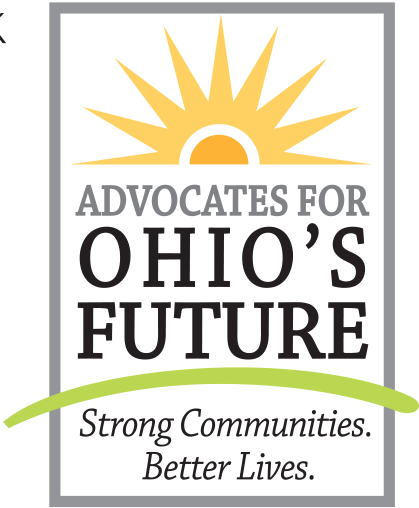Advocates for Ohio’s Future began in 2003 as the Emergency Campaign to Protect Ohio’s Future, a coalition of health and human service organizations seeking to protect Ohio’s most vulnerable citizens through a responsible state budget that adequately funded vital services.
The Emergency Campaign to Protect Ohio’s Future made its mark by standing in solidarity so that no one human service provider was pitted against another. Through a commitment to a broader vision of health and human services, the coalition celebrated many successes since its founding:
“The Penny Is Important” campaign in 2004 to increase the state sales tax by one cent to support health and human services;
Creation of a dedicated revenue source for the Housing Trust Fund in 2004;
Defeat of the so-called Taxpayer Bill of Rights in 2004 that would have set debilitating spending caps on vital services for children and other vulnerable populations; and
Increased funding for PASSPORT in several budget cycles – a program that provides in-home care for frail elderly at a cost much lower than nursing home care, keeping older Ohioans in their homes and self-sufficient.
In 2010, the Campaign to Protect Ohio’s Future became Advocates for Ohio’s Future to better reflect a long-term commitment to promote budget and policy solutions to strengthen families and communities at a time when so many Ohioans were struggling because of the recession.
In its first biennial budget (that began July 1, 2011) as Advocates for Ohio’s Future, important policy decisions were made to strengthen families and communities:
Medicaid eligibility and optional services (vision, dental) were maintained;
Home- and community-based long-term care services for seniors were prioritized over institutional care;
Medicaid match for behavioral health services was elevated to the state as a first step in integrating physical and behavioral health care;
The Ohio Housing Trust Fund was preserved despite attempts to redirect funding for affordable housing to county recorders;
Funding for adoption subsidies in child welfare was maintained;
Funding for Federally Qualified Health Centers was maintained; and
Access to early childhood services, such as child care and home visiting, was maintained for all currently enrolled families.
Despite the successes, funding for mental health and addiction services remained woefully inadequate. Local government social services were slashed, and waiting lists persisted for long-term care supports for people with disabilities.
In the 2014-2015 bienniel budget, Advocates for Ohio’s Future worked with and supported our partners to increase investments in families and communities, including:
$84 million was added for work supports (in the TANF budget),
$70 million was added for summer youth employment programs (in the TANF budget),
$66 million was added to employ hard to serve OWF clients (in the TANF budget),
$100 million was added for mental health and drug addiction,
$30 million was added for early education,
$8 million was added for direct care workers and the waiver rates for DD,
$6 million was added (state and federal) for PASSPORT,
$4 million was added for food banks,
Funding was restored to the Federally Qualified Health Centers,
Funding for the Ohio Housing Trust Fund was maintained at $100 million.
In all, an additional $368 million (state share) was invested over the biennium (over Fiscal Year 2014 and 2015) in families and communities in the state budget.
In October 21 2013, Ohio became the 25th state to expand Medicaid to all Ohioans up to 138% of the Federal Poverty Level.
